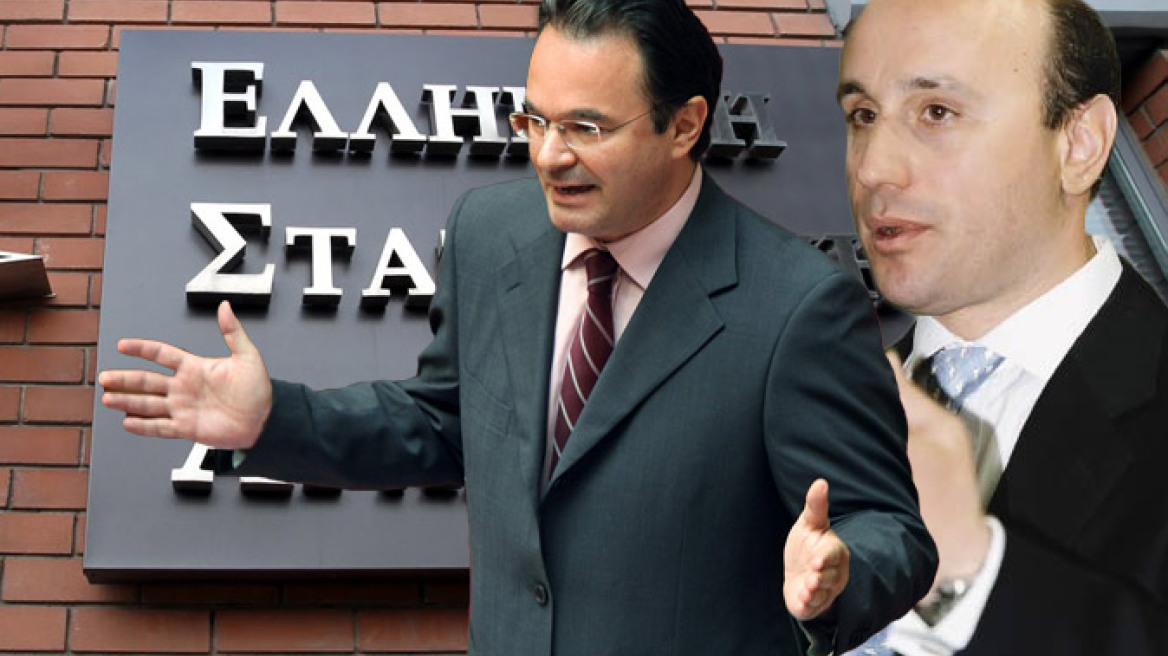
Titanic...
Titanic...
In April 2010, when we began, we initiated a very successful 5-year bond issuance, a very successful 10-year bond and the spreads...

UPD:
In April 2010, when we began, we initiated a very successful 5-year bond
issuance, a very successful 10-year bond and the spreads had begun being collected in Greece, and suddenly I was told that within a month, we will have another review. I was stunned”, stated Petros Christodoulou, general manager of the Public Debt Management Agency, to the investigative committee of the house for the 2009 deficit and the factors that led to the questioning of Greek statistics”.
When MP Panayiotis Kouroumplis asked if former FinMin Giorgos Papakonstantinou knew that the 2009 deficit was not 6% of GDP but approached 12.5%, Mr. Christodoulou replied that: “As I said, he knew about it”.
“Or he understood or suspected it, anyway”, continued Mr. Kouroumplis “and through figures from the Statistical Office, he could have found out”. “Alas”, replied Mr. Christodoulou, addressing the members of the committee: “Do not forget that between October, November and December 2009 and the summer of 20120, there were three revisions of the deficit. I remember in February when I began, I intended to issue Greek state bonds and suddenly I found out that another revision would take place the following week. And in April yet another one. I asked myself what was going on”.
After the publicity that Mr. Christodoulou's testimony in parliament received, which “targeted” Messrs. Papakonstantinou and Papandreou for their handlings, the chairman of the PDMA sought to disprove key points of his testimony. “The essence of my testimony concerned the mapping of the 2009 deficit, which h explained in detail that the amount of borrowing anew every year could not be significantly higher than the deficit announced at regular intervals to the public, as the Eurostat rules provide” stated Mr. Christodoulou, and added that “there was clear pressure from some members of the Commission to transform what was frankly tabled into 'accusations' against former FinMin G. Papakonstantinou. The pressure was made clear by how they interpreted and selectively channeled parts of my testimony”.
Indeed, the chairman of the PDMA warns against selective reporting of those statistics he submitted, which “could damage the interests of the country” and eventually form a “distorted public image”.
When asked how he would have reacted if he had been in Mr. Papakonstantinou’s place, Mr. Christodoulou “nailed” the former Czar, according to the minutes of the House.
When MP Panayiotis Kouroumplis asked if former FinMin Giorgos Papakonstantinou knew that the 2009 deficit was not 6% of GDP but approached 12.5%, Mr. Christodoulou replied that: “As I said, he knew about it”.
“Or he understood or suspected it, anyway”, continued Mr. Kouroumplis “and through figures from the Statistical Office, he could have found out”. “Alas”, replied Mr. Christodoulou, addressing the members of the committee: “Do not forget that between October, November and December 2009 and the summer of 20120, there were three revisions of the deficit. I remember in February when I began, I intended to issue Greek state bonds and suddenly I found out that another revision would take place the following week. And in April yet another one. I asked myself what was going on”.
After the publicity that Mr. Christodoulou's testimony in parliament received, which “targeted” Messrs. Papakonstantinou and Papandreou for their handlings, the chairman of the PDMA sought to disprove key points of his testimony. “The essence of my testimony concerned the mapping of the 2009 deficit, which h explained in detail that the amount of borrowing anew every year could not be significantly higher than the deficit announced at regular intervals to the public, as the Eurostat rules provide” stated Mr. Christodoulou, and added that “there was clear pressure from some members of the Commission to transform what was frankly tabled into 'accusations' against former FinMin G. Papakonstantinou. The pressure was made clear by how they interpreted and selectively channeled parts of my testimony”.
Indeed, the chairman of the PDMA warns against selective reporting of those statistics he submitted, which “could damage the interests of the country” and eventually form a “distorted public image”.
When asked how he would have reacted if he had been in Mr. Papakonstantinou’s place, Mr. Christodoulou “nailed” the former Czar, according to the minutes of the House.
“Regarding costs, I would have applied the brakes much earlier. Having said that, it is easier to judge things after they have happened than when you find yourself embroiled in them”, stated the PDMA head before the Members.
In the official text submitted, Mr. Christodoulou stated that “Since I was working alongside Mr. Papakonstantinou and Mr. Zanias, I do not think that it was their intention to revise the numbers by themselves. There was a close monitoring situation by EUROSTAT, which followed the parts which touched upon my own jurisdiction on what concerns the debt, the valuation of hidden derivative instruments and the debt we had constructed in the form of swaps with Goldman Sachs while there was close monitoring. I am in no position to know whether the Minister had the luxury to avoid this or not”.
The mere denial by Mr. Christodoulou that the decision to revise the 2009 deficit came from the former FinMin’s “own will” points to the fact that Mr. Papakonstantinou was responsible for the adjustment of the debt, which gradually pushed Greece out of the markets.
In his statement before the Members of the Committee, Mr. Christodoulou confirmed that the revision of the deficit upwards, not excluding Mr. Papakonstantinou’s involvement, was also the recipient of further interference from higher up.
This alone refutes Mr. Christodoulou’s recent claim that some MPs attempted to distort his words in order to incriminate Mr. Papaconstantinou.
In the official text submitted, Mr. Christodoulou stated that “Since I was working alongside Mr. Papakonstantinou and Mr. Zanias, I do not think that it was their intention to revise the numbers by themselves. There was a close monitoring situation by EUROSTAT, which followed the parts which touched upon my own jurisdiction on what concerns the debt, the valuation of hidden derivative instruments and the debt we had constructed in the form of swaps with Goldman Sachs while there was close monitoring. I am in no position to know whether the Minister had the luxury to avoid this or not”.
The mere denial by Mr. Christodoulou that the decision to revise the 2009 deficit came from the former FinMin’s “own will” points to the fact that Mr. Papakonstantinou was responsible for the adjustment of the debt, which gradually pushed Greece out of the markets.
In his statement before the Members of the Committee, Mr. Christodoulou confirmed that the revision of the deficit upwards, not excluding Mr. Papakonstantinou’s involvement, was also the recipient of further interference from higher up.
This alone refutes Mr. Christodoulou’s recent claim that some MPs attempted to distort his words in order to incriminate Mr. Papaconstantinou.
UPD:
Ακολουθήστε το protothema.gr στο Google News και μάθετε πρώτοι όλες τις ειδήσεις
Δείτε όλες τις τελευταίες Ειδήσεις από την Ελλάδα και τον Κόσμο, τη στιγμή που συμβαίνουν, στο Protothema.gr
Δείτε όλες τις τελευταίες Ειδήσεις από την Ελλάδα και τον Κόσμο, τη στιγμή που συμβαίνουν, στο Protothema.gr
ΡΟΗ ΕΙΔΗΣΕΩΝ
Ειδήσεις
Δημοφιλή
Σχολιασμένα






































